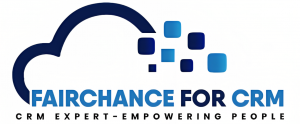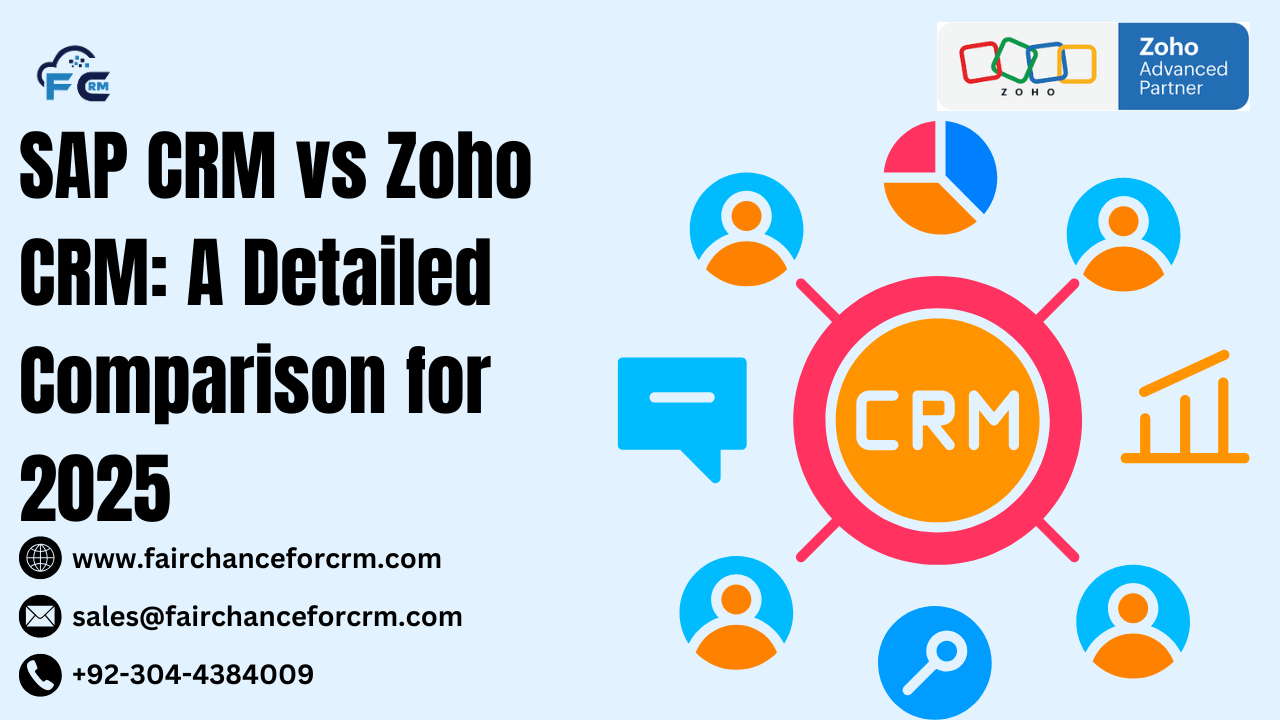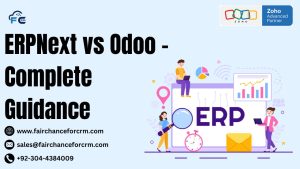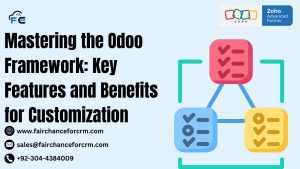SAP CRM vs Zoho CRM is today our topic. When it comes to choosing a CRM (Customer Relationship Management) system for your business, there are many options available, each catering to different business needs. Among the most prominent choices are SAP CRM and Zoho CRM. Both platforms have their unique strengths, but they are suited to different types of organizations, from large enterprises to small and medium-sized businesses (SMBs). In this blog, we’ll compare SAP CRM and Zoho CRM based on various factors like pricing, scope, features, benefits, and target market.
Also Read:
- Nimble CRM vs Zoho CRM: A Comprehensive Comparison for 2025
- Odoo Training in Dubai: Empowering Businesses ERP Solutions
- Odoo Customization for Retail in Saudi Arabia – FAIRCHANCE
- Copper CRM vs. Zoho CRM: A Comprehensive Comparison
- Zoho CRM Plus – Ultimate Customer Relationship Management
SAP CRM vs Zoho CRM
Overview of SAP CRM
SAP CRM is part of the SAP Customer Experience suite (formerly SAP C/4HANA) and is primarily used by large enterprises that require a robust, customizable, and scalable CRM solution. SAP CRM is often integrated with other SAP enterprise resource planning (ERP) systems to help businesses manage not only their customer relationships but also their core business processes.
Key Features:
- Sales automation
- Customer service management
- Marketing automation
- Analytics and reporting
- Integration with SAP ERP and other business systems
- Multichannel support (email, phone, social media)
- Custom workflows and automation
- Enterprise-level security and compliance
Overview of Zoho CRM
Zoho CRM, on the other hand, is a cloud-based CRM designed for businesses of all sizes. However, it is especially popular among small to mid-sized businesses due to its affordability, ease of use, and scalability. Zoho CRM offers a wide range of features to manage leads, sales, customer support, and marketing efforts, and it integrates well with the entire Zoho suite of applications.
Key Features:
- Lead and deal management
- Sales forecasting
- Email and social media integration
- Marketing automation
- AI-powered assistant (Zia)
- Workflow automation
- Extensive third-party integrations
- Reporting and analytics
SAP CRM vs Zoho CRM: Key Differences
- Target Audience & Scalability:
- SAP CRM is enterprise-focused and generally suits large organizations with complex business processes. It requires a high level of customization and technical expertise, making it ideal for businesses with dedicated IT teams.
- Zoho CRM is built for businesses of all sizes, from startups to medium enterprises. Its affordability, ease of use, and scalability make it more accessible to SMBs. It can also be customized, but it doesn’t require the same level of technical expertise as SAP.
- Features & Scope:
- SAP CRM provides a comprehensive suite of features for large enterprises, such as advanced analytics, multichannel support, workflow automation, and deep integration with SAP’s other ERP solutions. It is particularly suitable for companies that already use SAP for resource planning and other business functions.
- Zoho CRM, while feature-rich, offers a broader scope for SMBs that want CRM functionalities like lead management, email marketing, and analytics, along with integrations to other Zoho and third-party apps. It’s perfect for businesses looking for an all-in-one platform that is easy to use and affordable.
- Customization & Integration:
- SAP CRM offers advanced customization and is highly configurable. Businesses can tailor the system to their unique needs, but this often requires specialized knowledge and a higher level of IT support.
- Zoho CRM also offers customization but on a more accessible level. Users can create custom fields, modify workflows, and use pre-built templates for automating processes. Zoho CRM also integrates with hundreds of third-party apps, making it flexible for businesses that rely on multiple tools.
- Pricing:
- SAP CRM is pricey, as it is targeted at large enterprises. It typically involves not just the cost of the software but also the implementation, customization, and support costs. SAP CRM solutions can easily run into the tens of thousands of dollars or more, depending on the scope and complexity of the deployment.
- Zoho CRM is much more affordable, with plans starting as low as $14/user/month for the basic features. Even the higher-tier plans are relatively inexpensive compared to SAP CRM. This makes Zoho CRM ideal for SMBs that need a cost-effective CRM solution.
SAP CRM vs Zoho CRM Pricing Comparison
SAP CRM:
- SAP CRM’s pricing varies significantly depending on the scale and customization needs of the business. It’s not typically sold as a one-size-fits-all subscription plan and requires bespoke pricing based on the organization’s requirements. The total cost of ownership (TCO) may include:
- Licensing costs
- Implementation fees
- Training
- Maintenance and support
Typically, large enterprises can expect to spend thousands of dollars annually on SAP CRM, with enterprise-level deployment often involving custom integration and ongoing support.
Zoho CRM:
- Free Plan: Zoho CRM offers a free plan with basic features for up to 3 users.
- Standard Plan: Starting at $14/user/month, offering basic CRM features.
- Professional Plan: Starting at $23/user/month, including advanced CRM functionalities like sales forecasting, reporting, and social media integrations.
- Enterprise Plan: Starting at $40/user/month, which adds AI features (Zia), advanced reporting, and additional customization options.
- Ultimate Plan: Starting at $52/user/month, offering premium features like advanced analytics and dedicated support.
Scope and Use Cases
- SAP CRM is highly suitable for large corporations or businesses with complex needs, particularly those that already use SAP for other enterprise resource planning (ERP) functions. SAP CRM is ideal for organizations in sectors like manufacturing, retail, or finance that need integrated, data-driven solutions and have the resources to manage the complex implementation.
- Zoho CRM, on the other hand, works for a wider range of businesses, from small startups to larger organizations. Its ease of use, quick setup, and affordable pricing make it a go-to solution for businesses looking to improve sales and marketing processes without requiring a dedicated IT team. It’s also a great choice for organizations looking for an all-in-one solution that works with a variety of third-party tools.
Benefits of SAP CRM
- Powerful & Robust: SAP CRM offers advanced features and integrations that suit large enterprises with complex needs.
- Deep Integration: SAP integrates seamlessly with other SAP solutions (like SAP ERP), enabling a unified approach to business operations.
- Customizable: SAP CRM can be tailored to meet specific business processes, making it highly adaptable.
- Enterprise-Level Support: SAP offers excellent customer support and services, with enterprise-grade security and compliance options.
Benefits of Zoho CRM
- Affordable: Zoho CRM is significantly more affordable, making it ideal for SMBs and startups.
- Ease of Use: Zoho CRM is simple to set up and use, reducing the learning curve and time needed for training.
- Integration with Zoho Suite: If you are already using other Zoho tools (like Zoho Books, Zoho Campaigns), Zoho CRM provides seamless integration.
- Scalable: Zoho CRM grows with your business and offers additional features as needed.
- Advanced AI (Zia): Zoho CRM comes with Zia, an AI-powered assistant that helps automate tasks, analyze data, and offer sales insights.
Which CRM Should You Choose? SAP CRM vs Zoho CRM
- SAP CRM is best suited for large enterprises with complex requirements, especially those that already use SAP for ERP or other business functions. Its advanced features, deep integration capabilities, and scalability make it a powerful tool for businesses looking to manage extensive customer data and workflows across different departments.
- Zoho CRM, on the other hand, is more suited for SMBs and startups looking for a cost-effective, user-friendly, and flexible CRM solution that can grow with their needs. Zoho CRM offers a wider range of integrations, simple customization options, and a lower total cost of ownership compared to SAP CRM.
Final Thoughts
In conclusion, both SAP CRM vs Zoho CRM have their strengths, but they cater to very different audiences. SAP CRM is ideal for large businesses with complex, enterprise-wide CRM needs, while Zoho CRM is a great choice for smaller businesses that require an affordable, user-friendly CRM solution with a broad set of features. If you’re part of a large corporation, SAP may be the right choice for you, while Zoho CRM is perfect for businesses looking to enhance their customer relationships without breaking the bank.
For more information about the SAP CRM vs Zoho CRM: visit this link.
If you want to Free Trail Zoho, click on this link.




